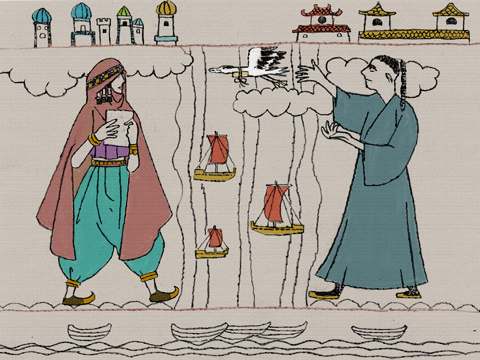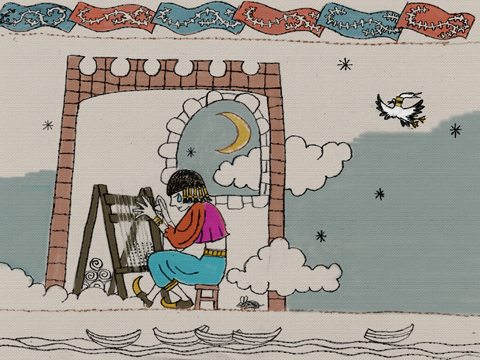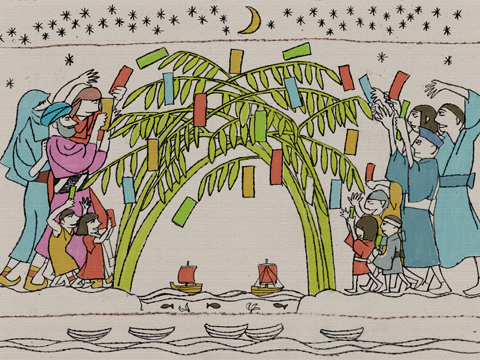Once again this year, Square Enix brings us the Vana'diel Celestial Nights. One thing that I always wanted to do since the 2007 edition was to have a saved copy of the fascinating folklore attached to the event. Finally found a copy on ffxiclopedia and tossed it here (as per a couple friends' request).
There is a legend that tells of a river formed from the infinite stars of the night sky, kupo. Here is the story behind Celestial Nights--a festival resurrected from the mists of the ancient past.
It was a sweltering summer afternoon when the princess, weary from several days of weaving, decided to take a walk along the bank of the river to clear her mind and refresh her spirit. The rush and roar of the river was a novel delight for Amdina, who had rarely left the grounds of the Imperial palace. Frolicking in the shallows with her handmaidens and oblivious to the passage of time, the princess was startled by the sudden appearance of a magpie that came to rest on a rock before her. Amdina had often woven the illustrations of such birds into her tapestries, but she had never before beheld one in the wild. Hoping for a closer look, Amdina began to approach the magpie, but it spread its wings and launched itself into the air before she had taken a single step.
The princess watched as the magpie soared to the other side of the river and landed next to a young man fishing in the swift waters. To Amdina it seemed that the bird and the sun-browned youth were quite familiar with one another. This was the first time the sheltered princess had laid eyes upon a citizen of the eastern nation. Catching sight of Amdina, the young man smiled broadly and waved. The princess, flustered by the encounter and unable to respond, quickly turned and left the river behind her.
From that night onwards, Amdina no longer weaved her tapestries. The Emperor, concerned for his suddenly oft-sighing and reclusive daughter, summoned a multitude of esteemed physicians to examine the princess. None could discover the cause of her malaise. Only Amdina herself knew the cure for her condition--she must once again visit the banks of the river.
One evening, after feigning illness and excusing herself from dinner, Amdina slipped out of the palace alone. She hurried as quickly as her slippered feet would carry her, but by the time she reached her destination, the night sky was ablaze with stars, and by their faint light the river appeared to meander through the countryside like an immense, onyx serpent.
As she broke the surface of the water with tentative toes, Amdina understood the compulsion that had drawn her to this place. On the far bank of the river, a young man stood holding a lantern aloft, the soft glow revealing the form of a magpie by his side. It was the very same youth Amdina had encountered those many days ago.
The young man began to slowly swing the lantern in a semi-circle before him. Had he seen her? No, the distance was too great, the light of the lantern too weak. And yet Amdina waved anyway. She waved with grim determination, as if by the very force of her will she could recapture the moment she had lost the first time they met. Amdina smiled then, just as the youth had that day, turned her back to the river, and started to walk away.
A flurry of feathers brought the princess to a halt. The magpie had landed directly in her path, a piece of white cloth visible around its neck, its head cocked in an inviting manner. Amdina bent down and untied the cloth with trembling fingers. The magpie chirped in seeming satisfaction and took to the sky once more.
What the princess had taken to be cloth was actually a pure white sheet of neatly folded papyrus, the quality of which she had never seen before. Amdina carefully opened the note to find a single vertical line of elegant characters.
"A message from the youth across the river!" she thought, excitedly.
The princess returned to the palace as quietly as she had left. She then secluded herself within the library and set to work, painstakingly deciphering the note character by character. When dawn finally found her, she sat unmoving in the same chair, a single tear shining upon her cheek. Though deceptively brief, the strange message had translated into a touching declaration of love.
Amdina now left the palace every night to exchange poems with her newfound companion, the ever-present magpie bearing their thoughts and feelings across the waters of the river. At first they wrote in their mother tongues, and then eventually in the language of the other...
But this gentle expression of budding love would come to an abrupt end. The Emperor, suspicious of Amdina's sudden and enthusiastic return to weaving, wrung the secret of the matter from her handmaidens. Further investigation led the Emperor to an astonishing fact: the youth with whom his daughter exchanged poems of devotion was none other than Prince Yahiko--the royal son of a rival nation's ruler and a fierce opponent on the battlefield.
Consumed with rage, the Emperor confined the princess inside the highest tower of the palace and put forth his terms: if she could weave one hundred tapestries worthy of purchase by the nobles of the empire, he would permit her to once again visit the banks of the river...
"He will be awaiting me this day, as he has waited on every other," she thought with desperation, and began weaving tapestries in frenzied haste.
But the tragedy did not end along with Amdina's life. Several months later, the Emperor's army had invaded the nation to the east--Amdina's father had convinced himself of his enemy's responsibility for her death. Prince Yahiko was part of the force that rode forth to meet this invasion, but he was slain by a stray arrow that found its way past his shield. His mind was not on the battle, but filled with thoughts of his lost love...
When the citizens learned of the events surrounding the prince's death, they expressed their grief by decorating bamboo stalks with poems written on colored strips of paper and planting them along the river. The people of the western nation, upon seeing the actions of their neighbors, began to imitate the custom. Before long, both banks of the river were covered in seemingly endless rows of decorated bamboo. The love and loss of the young couple had united the two nations in an outpouring of mutual grief.
Rumors of the event along the river soon reached the western court. Incensed that his people should participate in the customs of his enemy, the Emperor mounted his chocobo and galloped towards the border to witness the madness firsthand. The scene that greeted the Emperor left him awestruck--the great stalks of bamboo on either bank had bowed under the weight of their messages and appeared to form a bridge between the two nations.
Humbled and shamed, Amdina's father at last dispatched a messenger of peace to the ruler of the eastern court. With the consent of both countries, a day was set aside every year when citizens could freely cross the river and renew the bonds that had been forged in shared tragedy.
In the years to come, the river in the tale slowly became the legendary celestial river now famous in lands across the world, kupo. No one can say for sure where that mighty river, and the nations that bordered its waters, actually existed, kupo. The only thing that remains is the custom of summer "Celestial Nights" when people write poems to distant loved ones and tie them to bamboo stalks that symbolically span the river in the sky.
The M.H.M.U. has enlisted the cooperation of the nomad moogles in an attempt to recreate this heartwarming tradition, kupo. We hope this event will give you a moment away from your adventures to remember old friends, and even create the opportunity to reunite dear companions, kupo!



No comments:
Post a Comment